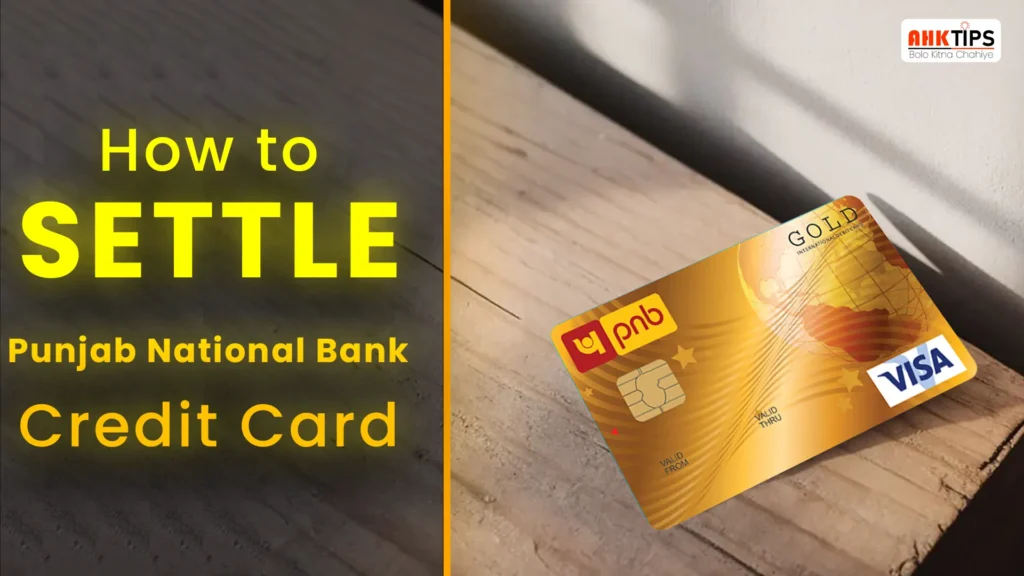Punjab National Bank (PNB) is a major player in India’s banking sector, providing a wide array of services, including credit cards. However, there may come a time when paying off your Punjab National Bank credit card dues becomes a challenge due to financial constraints. If you’re in such a situation, understanding the credit card settlement process with PNB can provide much-needed relief. In this comprehensive guide, we’ll explore how to approach the settlement process for your Punjab National Bank credit card and ensure a smoother resolution to your debt issues.
What is Credit Card Settlement?
Credit card settlement is a method through which a borrower can close their debt with the bank by paying a portion of the total outstanding amount. The settlement usually involves a one-time lump sum payment of a reduced amount, typically agreed upon through negotiation with the bank.
It’s important to note that credit card settlement doesn’t mean the debt is paid off in full. The bank agrees to “settle” for a lower amount in cases where the borrower faces significant financial distress.
When Should You opts for a Credit Card Settlement?
Considering a credit card settlement should be your last option if you’re struggling to repay your PNB credit card debt. You might opt for settlement in the following cases:
- You have faced a sudden financial crisis like job loss, health emergencies, or personal setbacks.
- You’re unable to keep up with the high-interest charges and late fees, and the debt amount is spiralling out of control.
- Other debt management solutions, like EMI conversion or personal loans, are not feasible for you.
Settling a credit card debt should only be chosen when other repayment methods have been exhausted, as it will have an impact on your credit score.
Steps to Settle Punjab National Bank Credit Card Debt
Step 1: Assess Your Financial Situation
Before approaching Punjab National Bank, take stock of your financial position. You need to have a clear idea of your outstanding dues and how much you can realistically pay as a settlement. This will help you during the negotiation process.
Step 2: Contact PNB for a Settlement
Reach out to PNB’s credit card division or customer care department to initiate the settlement discussion. You can do this through:
- Phone: Call PNB’s customer care and ask to speak to the collections or recovery team.
- Email: Send an email detailing your financial hardship and request a settlement option.
- Branch Visit: Visit the nearest PNB branch to discuss your situation with a bank representative.
Be prepared to explain why you cannot pay the full amount and emphasise your willingness to settle the dues.
Step 3: Negotiate the Settlement Terms
PNB will review your case and may offer a settlement amount, which is often a percentage of the total dues (typically between 50-80%). Be sure to negotiate effectively, as the bank may be open to revising the terms, especially if you’re willing to make a lump sum payment.
During negotiations, clarify:
- The total settlement amount.
- Whether the bank will waive interest or late payment fees.
- The deadline for making the payment.
It is advisable to stay firm on an amount you can afford while being realistic about what the bank might accept.
Step 4: Obtain a Written Settlement Agreement
Once a settlement amount has been agreed upon, ensure you receive a written settlement agreement from Punjab National Bank. This agreement should clearly state:
- The settlement amount and due date.
- Confirmation that this payment will close your credit card account.
- Assurance that no further dues will be claimed after the settlement.
Having a written agreement will protect you from any future complications or additional demands.
Step 5: Make the Payment and Secure Documentation
After making the payment, it is crucial to obtain a No Dues Certificate or a Settlement Completion Letter from the bank. This document confirms that you’ve settled the credit card dues, and no further payments are owed.
You should also check with the bank to ensure your credit report reflects that the account has been settled to avoid issues later.
PNB Credit Card Settlement Policy
Punjab National Bank’s settlement policy aims to help customers in financial distress by offering settlement options. Here’s a quick look at PNB’s settlement policy:
- Eligibility: Customers who have been in default for more than 90 days are typically eligible for settlement discussions.
- Settlement Amount: The settlement amount is usually between 50-80% of the total outstanding balance, depending on individual circumstances.
- Timeline: Once the settlement amount is agreed upon, the payment must generally be made within 30 days or as per the agreed schedule.
Impact of Credit Card Settlement on Your Credit Score
While credit card settlement might offer immediate financial relief, it does come with a downside — it affects your credit score. Here’s how:
- Settled Status: The credit bureau will update your account as “settled” rather than “paid in full.” This status signals that you did not repay the full amount, which is seen negatively by lenders.
- Score Impact: Your credit score may drop significantly due to the settlement. The exact reduction depends on your credit history and other factors.
- Long-Term Consequences: The “settled” status can remain on your credit report for up to 7 years, making it more challenging to secure future credit or loans.
However, the good news is that settling the debt can help prevent further damage from ongoing defaults.
Alternatives to Credit Card Settlement
If you want to avoid the negative impact on your credit score, you might want to explore some alternatives:
EMI Conversion
PNB offers the option to convert your outstanding credit card dues into EMIs. This allows you to pay off the debt in smaller, manageable instalments over a period of time, without resorting to settlement.
Balance Transfer
Another option is to transfer your outstanding balance to a credit card with a lower interest rate. This helps you pay off the dues more easily, without affecting your credit score.
Debt Consolidation
Consider taking out a personal loan to consolidate your debt. The loan can be used to pay off your credit card debt, and you can then repay the loan over time with lower interest rates.
Conclusion
Settling your Punjab National Bank credit card dues can help you alleviate the burden of debt, but it should only be pursued as a last resort. By following the steps outlined in this guide — from negotiating with the bank to securing written documentation — you can ensure that the process goes smoothly and that you avoid future complications.
While credit card settlement can give you immediate financial relief, it does impact your credit score. Thus, it’s important to carefully weigh the pros and cons before deciding to proceed. If settlement seems like the right option for you, taking the correct steps can make a huge difference in your financial health and peace of mind.
Frequently Asked Questions (FAQ’s)
Ans: Punjab National Bank generally settles for around 50-80% of the total outstanding dues, depending on your financial situation and negotiation.
Ans: The settlement process typically takes between 30-60 days, depending on how quickly the negotiation is completed and the payment is made.
Ans: Yes, while settling your credit card debt impacts your credit score, you can work towards rebuilding it by making timely payments on other credit obligations and using credit responsibly going forward.
Ans: Yes, always ensure you obtain a No Dues Certificate or Settlement Completion Letter from Punjab National Bank after completing the settlement. This will serve as proof that the debt has been fully resolved.













